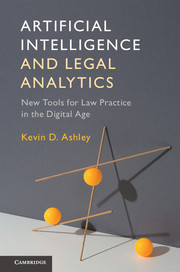Book contents
- Frontmatter
- Dedication
- Contents
- List of illustrations
- List of tables
- Acknowledgments
- PART I COMPUTATIONAL MODELS OF LEGAL REASONING
- PART II LEGAL TEXT ANALYTICS
- 6 Representing Legal Concepts in Ontologies and Type Systems
- 7 Making Legal Information Retrieval Smarter
- 8 Machine Learning with Legal Texts
- 9 Extracting Information from Statutory and Regulatory Texts
- 10 Extracting Argument-Related Information from Legal Case Texts
- PART III CONNECTING COMPUTATIONAL REASONING MODELS AND LEGAL TEXTS
- Glossary
- Bibliography
- Index
7 - Making Legal Information Retrieval Smarter
from PART II - LEGAL TEXT ANALYTICS
Published online by Cambridge University Press: 13 July 2017
- Frontmatter
- Dedication
- Contents
- List of illustrations
- List of tables
- Acknowledgments
- PART I COMPUTATIONAL MODELS OF LEGAL REASONING
- PART II LEGAL TEXT ANALYTICS
- 6 Representing Legal Concepts in Ontologies and Type Systems
- 7 Making Legal Information Retrieval Smarter
- 8 Machine Learning with Legal Texts
- 9 Extracting Information from Statutory and Regulatory Texts
- 10 Extracting Argument-Related Information from Legal Case Texts
- PART III CONNECTING COMPUTATIONAL REASONING MODELS AND LEGAL TEXTS
- Glossary
- Bibliography
- Index
Summary
INTRODUCTION
If computational models of legal reasoning and argument are to have a greater impact on law practice, say by enabling legal apps in the mode of cognitive computing, they will likely need to do so in conjunction with existing commercial and institutional approaches to full-text legal information retrieval and e-discovery. While the contribution of AI & Law could be substantial, the techniques may best be applied at the margins of existing commercial tools, whose processes for corpus management, indexing and index maintenance, and search are well-established, reliable, and efficient. Thus, before one anticipates the “value-added” of legal apps and cognitive computing, it is well to understand the existing technology for legal information retrieval.
This chapter explains current techniques for full-text legal information retrieval of case decisions, statutes, and other documents. These are the current tools of legal research that law students and legal professionals employ in constructing legal arguments and writing briefs. The chapter illustrates a role of legal ontologies in improving full-text legal information retrieval through query expansion and explains how some AI & Law techniques have already been harnessed to help legal information retrieval take semantic information into account for assessing relevance.
The chapter discusses the following questions: What is an inverted index? How is relevance measured in a full-text legal IR system and how does that compare with relevance measures of AI & Law models? How is the probability of a document's relevance to a query computed? What is query expansion? How can AI & Law approaches be integrated with legal IR without requiring changes to the way IR systems represent and index legal texts?
CURRENT LEGAL INFORMATION RETRIEVAL SERVICES
A viable route for realizing practical legal apps is by developing cognitive computing modules to add on to full-text legal information retrieval services. In order to understand how this might be accomplished, it is useful to understand current legal information retrieval techniques.
Full-text legal information retrieval services are well-established in certain legal markets such as in the United States. Legal practitioners know how to use the services, employ them routinely, and express confidence in them. In American law schools, students have access to Westlaw and LexisNexis as part of their legal education and tend to rely on them habitually.
- Type
- Chapter
- Information
- Artificial Intelligence and Legal AnalyticsNew Tools for Law Practice in the Digital Age, pp. 210 - 233Publisher: Cambridge University PressPrint publication year: 2017



